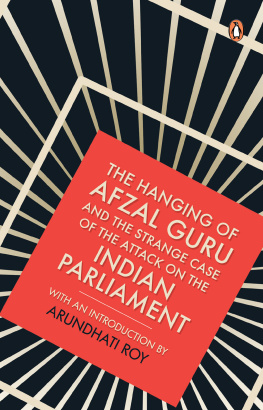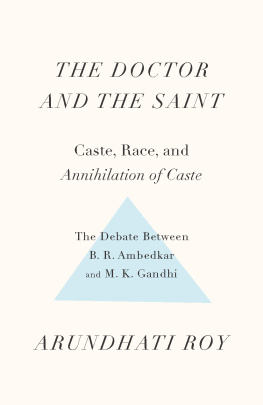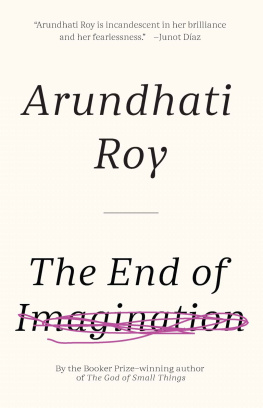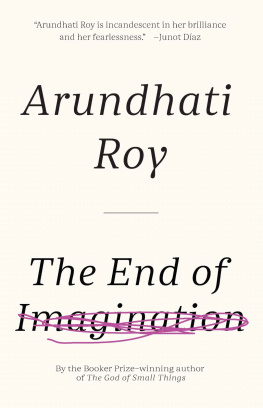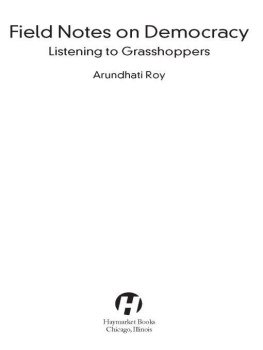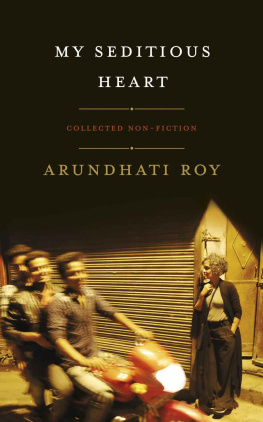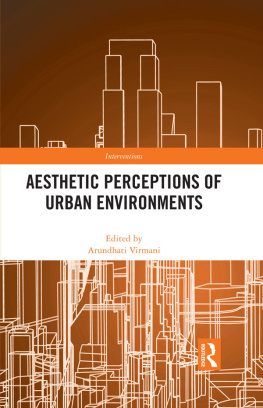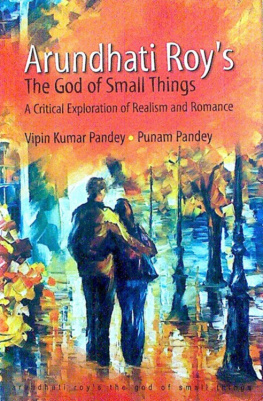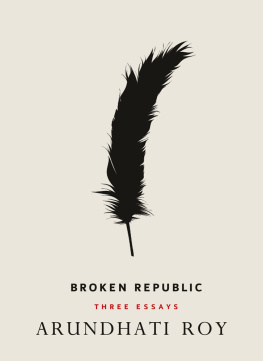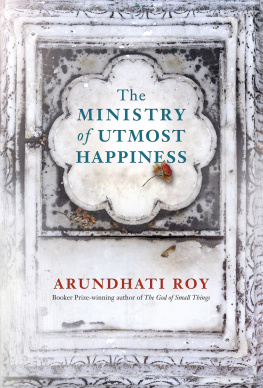Arundhati Roy - The God of Small Things: A Novel
Here you can read online Arundhati Roy - The God of Small Things: A Novel full text of the book (entire story) in english for free. Download pdf and epub, get meaning, cover and reviews about this ebook. year: 2008, publisher: Random House Publishing Group, genre: Detective and thriller. Description of the work, (preface) as well as reviews are available. Best literature library LitArk.com created for fans of good reading and offers a wide selection of genres:
Romance novel
Science fiction
Adventure
Detective
Science
History
Home and family
Prose
Art
Politics
Computer
Non-fiction
Religion
Business
Children
Humor
Choose a favorite category and find really read worthwhile books. Enjoy immersion in the world of imagination, feel the emotions of the characters or learn something new for yourself, make an fascinating discovery.

- Book:The God of Small Things: A Novel
- Author:
- Publisher:Random House Publishing Group
- Genre:
- Year:2008
- Rating:3 / 5
- Favourites:Add to favourites
- Your mark:
- 60
- 1
- 2
- 3
- 4
- 5
The God of Small Things: A Novel: summary, description and annotation
We offer to read an annotation, description, summary or preface (depends on what the author of the book "The God of Small Things: A Novel" wrote himself). If you haven't found the necessary information about the book — write in the comments, we will try to find it.
The God of Small Things: A Novel — read online for free the complete book (whole text) full work
Below is the text of the book, divided by pages. System saving the place of the last page read, allows you to conveniently read the book "The God of Small Things: A Novel" online for free, without having to search again every time where you left off. Put a bookmark, and you can go to the page where you finished reading at any time.
Font size:
Interval:
Bookmark:
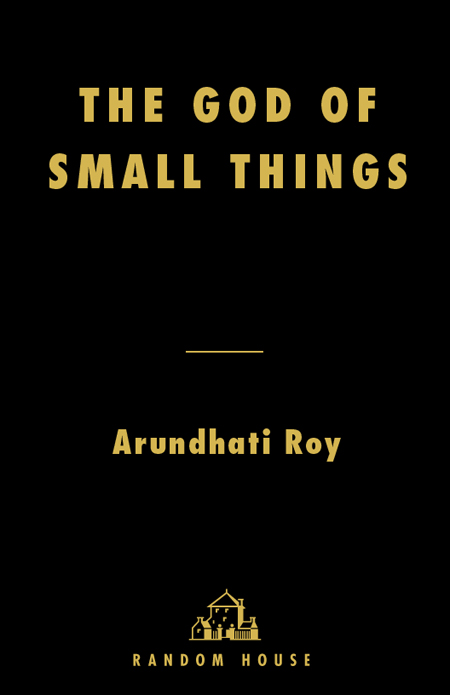
THE GOD OF SMALL THINGS
The story is not just about some godforsaken tribe but about love and cruelty, time and disintegration. It is frightening, beautiful, unrelenting.
New York Review of Books
Dazzling remarkable.A novel that turns out to be as subtle as it is powerful, a novel that is Faulknerian in its ambitious tackling of family and race and class, Dickensian in its sharp-eyed observation of society and character.
New York Times
Its hard to avoid using words like splendid and stunning to describe this debut novel. The God of Small Things is the strongest kind of novel. Its the kind of novel you want to read again.
Washington Post Book World
This outstanding novel is a banquet for all the senses we bring to reading.
Newsweek
A stunning first novel, this book is sure to send ripplesand even stir up wavesfor a long time to come.
Time Out New York
Roy has written this passionate and tragic tale in language so vivid, so imaginative, that at times it seems to take on the shape of the things it describes.
Seattle Times
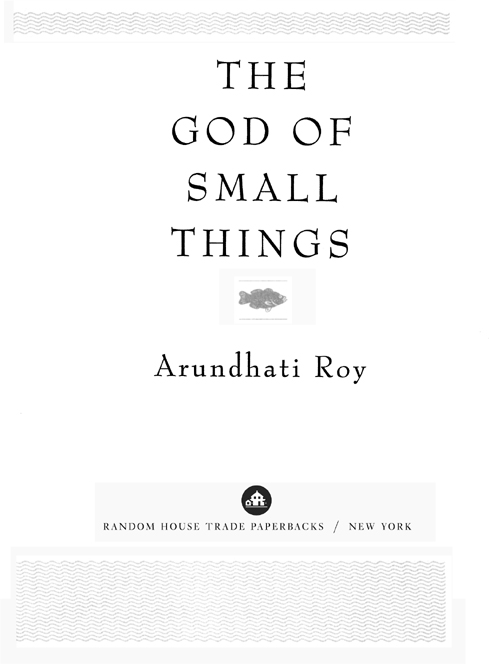
For Mary Roy,
who grew me up.
Who taught me to say excuse me
before interrupting her in Public.
Who loved me enough to let me go.
For LKC, who, like me, survived.
Never again will a single story be told
as though its the only one.
J OHN B ERGER
Pradip Krishen, my most exacting critic, my closest friend, my love. Without you this book wouldnt have been this book.
Pia and Mithva for being mine.
Aradhana, Arjun, Bete, Chandu, Golak, Ind, Joanna, Philip, Veena, Sanju and Viveka for seeing me through the years it took to write this book.
Pankaj Mishra for flagging it off on its journey into the world.
Alok Rai and Shomit Mitter, for being the kind of readers that writers dream about.
David Godwin, flying agent, guide and friend. For taking that impulsive trip to India. For making the waters part.
Neelu, Sushma and Krishnan for keeping my spirits up and my hamstrings in working order.
Nahid Bilgrami for arriving just in time.
And finally but immensely, Dadi and Dada. For their love and support.
Thank you.
PARADISE PICKLES & PRESERVES
M ay in Ayemenem is a hot, brooding month. The days are long and humid. The river shrinks and black crows gorge on bright mangoes in still, dustgreen trees. Red bananas ripen. Jackfruits burst. Dissolute bluebottles hum vacuously in the fruity air. Then they stun themselves against clear windowpanes and die, fatly baffled in the sun.
The nights are clear, but suffused with sloth and sullen expectation.
But by early June the southwest monsoon breaks and there are three months of wind and water with short spells of sharp, glittering sunshine that thrilled children snatch to play with. The countryside turns an immodest green. Boundaries blur as tapioca fences take root and bloom. Brick walls turn mossgreen. Pepper vines snake up electric poles. Wild creepers burst through latente banks and spill across the flooded roads. Boats ply in the bazaars. And small fish appear in the puddles that fill the PWD potholes on the highways.
It was raining when Rahel came back to Ayemenem. Slanting silver ropes slammed into loose earth, plowing it up like gunfire. The old house on the hill wore its steep, gabled roof pulled over its ears like a low hat. The walls, streaked with moss, had grown soft, and bulged a little with dampness that seeped up from the ground. The wild, overgrown garden was full of the whisper and scurry of small lives. In the undergrowth a rat snake rubbed itself against a glistening stone. Hopeful yellow bullfrogs cruised the scummy pond for mates. A drenched mongoose flashed across the leaf-strewn driveway.
The house itself looked empty. The doors and windows were locked. The front verandah bare. Unfurnished. But the skyblue Plymouth with chrome tailfins was still parked outside, and inside, Baby Kochamma was still alive.
She was Rahels baby grandaunt, her grandfathers younger sister. Her name was really Navomi, Navomi Ipe, but everybody called her Baby. She became Baby Kochamma when she was old enough to be an aunt. Rahel hadnt come to see her, though. Neither niece nor baby grandaunt labored under any illusions on that account. Rahel had come to see her brother, Estha. They were two-egg twins. Dizygotic doctors called them. Born from separate but simultaneously fertilized eggs. EsthaEsthappenwas the older by eighteen minutes.
They never did look much like each other, Estha and Rahel, and even when they were thin-armed children, flat-chested, wormridden and Elvis Presley-puffed, there was none of the usual Who is who? and Which is which? from oversmiling relatives or the Syrian Orthodox bishops who frequently visited the Ayemenem House for donations.
The confusion lay in a deeper, more secret place.
In those early amorphous years when memory had only just begun, when life was full of Beginnings and no Ends, and Everything was Forever, Esthappen and Rahel thought of themselves together as Me, and separately, individually, as We or Us. As though they were a rare breed of Siamese twins, physically separate, but with joint identities.
Now, these years later, Rahel has a memory of waking up one night giggling at Esthas funny dream.
She has other memories too that she has no right to have.
She remembers, for instance (though she hadnt been there), what the Orangedrink Lemondrink Man did to Estha in Abhilash Talkies. She remembers the taste of the tomato sandwichesEsthas sandwiches, that Estha ateon the Madras Mail to Madras.
And these are only the small things.
Anyway, now she thinks of Estha and Rahel as Them, because, separately, the two of them are no longer what They were or ever thought Theyd be.
Ever.
Their lives have a size and a shape now. Estha has his and Rahel hers.
Edges, Borders, Boundaries, Brinks and Limits have appeared like a team of trolls on their separate horizons. Short creatures with long shadows, patrolling the Blurry End. Gentle half-moons have gathered under their eyes and they are as old as Ammu was when she died. Thirty-one.
Not old.
Not young.
But a viable die-able age.
They were nearly born on a bus, Estha and Rahel. The car in which Bab, their father, was taking Ammu, their mother, to hospital in Shillong to have them, broke down on the winding tea-estate road in Assam. They abandoned the car and flagged down a crowded State Transport bus. With the queer compassion of the very poor for the comparatively well off, or perhaps only because they saw how hugely pregnant Ammu was, seated passengers made room for the couple, and for the rest of the journey Estha and Rahels father had to hold their mothers stomach (with them in it) to prevent it from wobbling. That was before they were divorced and Ammu came back to live in Kerala.
According to Estha, if theyd been born on the bus, theyd have got free bus rides for the rest of their lives. It wasnt clear where hed got this information from, or how he knew these things, but for years the twins harbored a faint resentment against their parents for having diddled them out of a lifetime of free bus rides.
Font size:
Interval:
Bookmark:
Similar books «The God of Small Things: A Novel»
Look at similar books to The God of Small Things: A Novel. We have selected literature similar in name and meaning in the hope of providing readers with more options to find new, interesting, not yet read works.
Discussion, reviews of the book The God of Small Things: A Novel and just readers' own opinions. Leave your comments, write what you think about the work, its meaning or the main characters. Specify what exactly you liked and what you didn't like, and why you think so.

